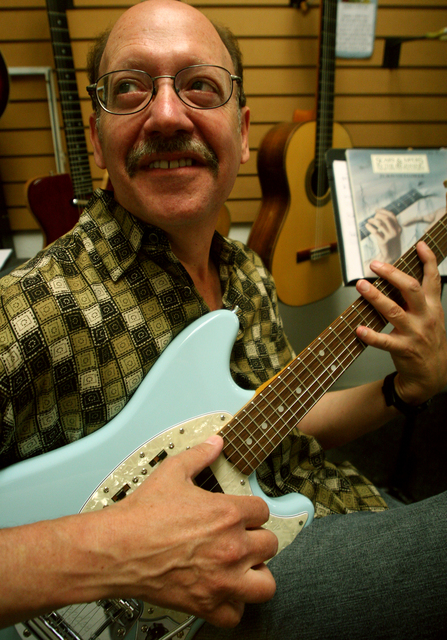As soon as you step in the door at Marc’s Guitar Center, you’re greeted by a long wall of electric beauties. More than a hundred models of guitars from all over the world lay at your fingertips. Just below are a series of amps that range from the comically small to the frighteningly large. Scanning the store’s pick collection reveals close to 200 different kinds, and Marc’s also has plenty of acoustic guitars for the unplugged connoisseur. In his three decades in the guitar biz, store owner Marc Foman has become adept at embracing life’s silver linings. Rather than feeling threatened by big box music stores, he says the chains should be scared of his business. “It’s them who can’t compete with us if we do our job right,” Foman asserts. “They’ll never offer the quality of service we do. It’s not in their business model.”The Internet has forced him to slash prices on his merchandise to compete with online stores. But Foman sees technological expansion as a sign the guitar will continue to grow in popularity. “Things like the video game Guitar Hero are great for business,” Foman says. “People play it and they think it’s cool, and then they think, I bet it would be even cooler to actually play a real guitar. ”Foman has watched his business grow from a guitar teaching studio run out of his student ghetto apartment to a multi-room storefront on Central and Cornell—one that’s sold 20,000 guitars and given 200,000 guitar lessons. “Did I ever think I would be in business for 30 years?” the Boston native muses. “Absolutely not.” Foman staffs his store with knowledgeable musicians who know what it’s like to be on the other side of the counter. “We might be closing up shop and a musician will come in who needs a strap or some extra strings,” Foman says. “We’ll keep the store open a little longer, because we know what it’s like to play a gig. Something’s always broken, so you need to have doubles of almost everything.”Though he’s been in a handful of bands during the 45 years he’s played guitar, Foman says his days of public performance are over. “It’s exciting for a while, but it’s a young person’s business,” Foman says. “You don’t see many middle-aged guys playing smoky clubs.”His passion for concerts may have waned, but the love of his business stayed strong. Marc’s still has two full-time guitar and bass instructors who teach about 100 people a week. Foman teaches too, but he says his primary job is to sell guitars, basses, amps and accessories, so his wife and co-owner, Linda Volz, can pay the bills.After 30 years, Foman is still surprised by how beloved his instrument of choice is. “The guitar is the most popular instrument in the world,” he says. “The number of people that play guitar still overwhelms me.”After closing up shop on an especially busy evening, Foman spoke with the Alibi about what it takes to keep a locally owned music store in tune with its customers. Your business has always provided guitar lessons. What does it take to keep someone interested in learning to play? We teach people the kind of music they’re interested in playing. It’s not like they’re working out of a boring text book. Students bring in CDs to us and we’ll teach them how to play their favorite songs. If people are interested in music theory, we’ll tie the theory into their specific musical interests. What would you say to people who believe lessons impede on personal playing style? Yeah, there are two schools of thought on that. I don’t fight that issue too much because of Paul McCartney and John Lennon, who didn’t take lessons because they didn’t want to know the rules. They obviously wrote some amazing songs. For me, I’ve taken a lot of lessons and they’ve helped me tremendously. I think when you take lessons it can expose you to things you never would have tried. What’s your all-time favorite guitar lick? Oh, wow! There are thousands of great ones. Probably the beginning of “Purple Haze” by Jimmy Hendrix. What kind of guitar do you play? I own a Charvel and a Samick guitar. Our main lines are some of the major brand names, Fender, Ibanez and Guild. Oddly, I don’t own any of those. Talk about the music trends the shop’s seen come and go. In the ’80s, music was getting much more complex and difficult to play. Bands like Van Halen had amazing guitar players, who were technically very proficient. Then Nirvana came out and you could learn just a few chords and play all their stuff. How did that shift affect your business? It was a nice thing because people would come in wanting to play like Eddy Van Halen overnight, and you just can’t do that. With bands like Nirvana, you can get started playing a lot faster. How has the University/Nob Hill area changed since you opened? Both areas are being gentrified. You’ve got condos going up a few blocks away on Harvard and in Nob Hill as well. That’s good for business, because if you’ve got someone down the street who can afford a $300,000 condo, they can afford to buy a guitar. Other than superior customer service, what’s the best way to survive as a local music store owner in Albuquerque? You have to be stubborn and dedicated.
Marc’s Guitar Center offers guitar sales, lessons, repairs and rentals at 2324 Central SE. Store hours are 10 a.m.-6 p.m. Monday through Friday, and 10 a.m. to 5:30 p.m. on Saturday. Call 265-3315 for more product and service information, or plug in online at marcsguitarcenter.com.













